Background
Lewis Samuel Feuer was born on December 7, 1912, in New York City's Lower East Side, United States.

1969
Lewis Samuel Feuer, activist, educator, sociologist, scholar, author.
Lewis Samuel Feuer, activist, educator, sociologist, scholar, author.
Lewis Samuel Feuer with his daughter Robin Feuer Miller.
Lewis Samuel Feuer, activist, educator, sociologist, scholar, author.






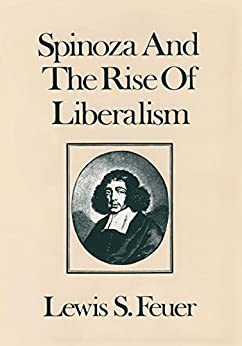
(In this classic work the author undertakes to show how Sp...)
In this classic work the author undertakes to show how Spinoza's philosophical ideas, particularly his political ideas, were influenced by his underlying emotional responses to the conflicts of his time. It thus differs form most professional philosophical analyses of the philosophy of Spinoza. The author identifies and discusses three periods in the development of Spinoza's thought and shows how they were reactions to the religious, political and economic developments in the Netherlands at the time.
https://www.amazon.com/Spinoza-Rise-Liberalism-Lewis-Feuer-ebook/dp/B0761Y2GTP/ref=sr_1_1?dchild=1&keywords=Spinoza+and+the+Rise+of+Liberalism&qid=1591252137&sr=8-1
1958
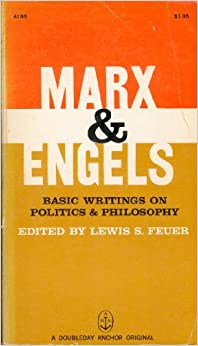
(Basic writings on politics and philosophy by Marx and Eng...)
Basic writings on politics and philosophy by Marx and Engels including little-known letters and essays.
https://www.amazon.com/Marx-Engels-Writings-Politics-Philosophy/dp/B000SB579K/ref=sr_1_1?dchild=1&keywords=Karl+Marx+and+Friedrich+Engels%2C+Basic+Writings+on+Politics+and+Philosophy&qid=1591260426&sr=8-1
1959
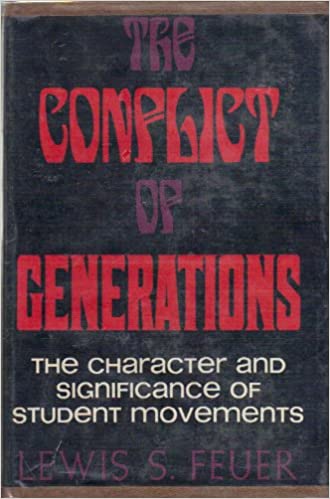
(Through this work, Professor Lewis Feuer proposes a theor...)
Through this work, Professor Lewis Feuer proposes a theory of student rebellion - in terms of the recurrent "conflict of generations." He finds that students, given a choice of political means, usually "choose the one which involves a higher measure of violence and humiliation directed against the older generation." This irrational element of student politics, according to the author, explains why student rebellions often sow the seeds of their destruction and betray their professed ideals. "The Conflict of Generations" brings to light the tragic pattern of irrationality and self-destructiveness to which student movements succumb. As soon as this pattern is fully understood, Professor Feuer believes, a higher idealism will emerge from student uprisings.
https://www.amazon.com/Conflict-Generations-Character-Significance-Movements/dp/B0006BWI6C/ref=sr_1_2?dchild=1&keywords=The+Conflict+of+Generations%3A+The+Character+and+Significance+of+Student+Movements&qid=1591251332&sr=8-2
1969
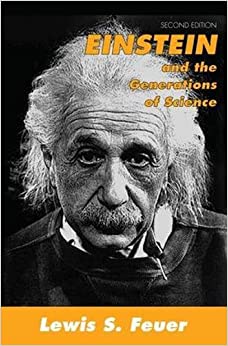
(This absorbing intellectual history vividly recreates the...)
This absorbing intellectual history vividly recreates the unique social, political, and philosophical milieu in which the extraordinary promise of Einstein and scientific contemporaries took root and flourished into greatness. Lewis Feuer shows us that no scientific breakthrough really happens by chance; it takes a certain intellectual climate, a decisive tension within the very fabric of society, to spur one man's potential genius into world-shaking achievement. Feuer portrays such men of high imaginative powers as Einstein, Bohr, Heisenberg, de Broglie, influenced by and influencing the social worlds in which they lived.
https://www.amazon.com/Lewis-S-Feuer/dp/0878558993/ref=sr_1_1?dchild=1&keywords=Einstein+and+the+Generations+of+Science&qid=1591260339&sr=8-1
1974
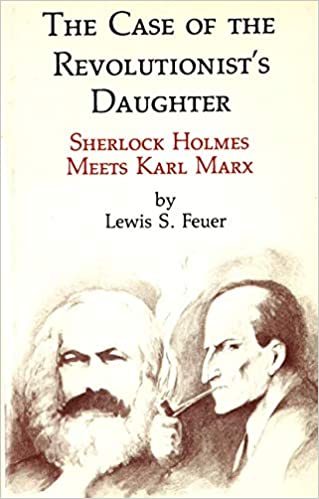
(Eleanor Marx has disappeared. In this engrossing novel, w...)
Eleanor Marx has disappeared. In this engrossing novel, we follow Sherlock Holmes as he tackles his most difficult case. He must find Karl Marx's favorite daughter and return her to the house of her father. At the behest of Frederick Engels, Holmes undertakes the search for Eleanor that leads him into a world he has never encountered before, the fascinating Bohemian intellectual world of London in 1881.
https://www.amazon.com/Case-Revolutionists-Daughter-Sherlock-Holmes/dp/0879752459/ref=sr_1_1?dchild=1&keywords=The+Case+of+the+Revolutionist%E2%80%99s+Daughter%3A+Sherlock+Holmes+Meets+Karl+Marx&qid=1591255908&sr=8-1
1983
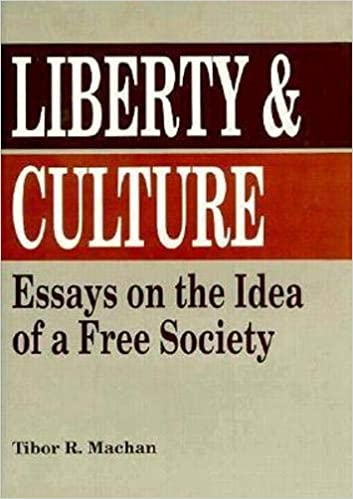
(Lewis Feuer has presented a remarkable thesis in Imperial...)
Lewis Feuer has presented a remarkable thesis in Imperialism and the Anti-Imperialist Mind. Feuer regards imperialism as a natural political process and one that is endemic to all nations under all political and social systems. The significant distinction to make is whether a given imperialistic period is progressive or regressive. The greatest historical advances, maintains Feuer, have been made during progressive imperialistic eras, such as the Hellenic-Macedonian, the Roman, and the modern British periods. Retrogression took place under the Tartar and Spanish imperialisms. Feuer claims that neo-Marxists are wrong when they cite the relative backwardness of colonial peoples and blame the condition on the imperialism of advanced Western nations.
https://www.amazon.com/Imperialism-Anti-Imperialist-Mind-Lewis-Feuer/dp/0879753390/ref=sr_1_1?dchild=1&keywords=Imperialism+and+the+Anti-Imperialist+Mind&qid=1591252975&sr=8-1
1986
activist educator sociologist author scholars
Lewis Samuel Feuer was born on December 7, 1912, in New York City's Lower East Side, United States.
Lewis Samuel Feuer excelled at academics and began high school when he was just 10 years old. He earned a Bachelor of Science from City College of the City University of New York in 1931 and went on to complete a Master of Arts in 1932 and a Doctor of Philosophy in 1935 at Harvard University. His dissertation, completed under the direction of Alfred North Whitehead, was entitled The Philosophical Analysis of Space and Time.
Lewis Samuel Feuer was an instructor at City College until the war started. During World War II, he was an army sergeant who was demoted to private after standing up for workers in New Caledonia by helping them to organize against what they considered slave-labor practices in building airstrips. Returning home, Feuer accepted a post as an associate professor of philosophy at Vassar College, but in 1951 he quit after a personality conflict with another professor led to a fistfight. He then moved to the University of Vermont as a professor of philosophy and, in 1957, to the University of California at Berkeley where he taught philosophy and sociology. In 1963, he took part in an early academic exchange with the Soviet Union and began a series of lectures on Marxism at Moscow University (now Lomonosov Moscow State University). What he had to say displeased his hosts, who ordered students away after the first lecture. Before leaving, he also had spirited exchanges with his Soviet counterparts on subjects like freedom of speech and the status of Soviet Jewry.
From 1966 to 1976, Feuer taught sociology at the University of Toronto; he finished his academic career at the University of Virginia, where he taught sociology and the humanities from 1976 until his retirement as emeritus professor in 1988.
Many of Feuer's books and articles dealt with the psychological roots of modern science and European philosophy. Feuer stands as one of the founders of the sociology of emotions. His works re-conceives the significance of irrationality and emotion in human affairs. Much of his works, especially Psychoanalysis and Ethics (1955) and The Conflict of Generations (1969), focus on the psychodynamics of historical processes and social movements.
Feuer touched off far-reaching arguments across a wide ideological divide when he interpreted the student rebellions of the 1960s as a largely generational confrontation. He compiled a paperback anthology, ''Karl Marx and Friedrich Engels, Basic Writings on Politics and Philosophy'' (1959), which appeared just as a decade of campus unrest over race and the Vietnam War began. It was required reading for the New Left of the 1960s. Feuer struck a nerve with ''The Conflict of Generations: The Character and Significance of Student Movements'' (1969). It contended that student alienation arose chiefly from the age-old clash between fathers and sons.
His interest in matters philosophical was matched by a fascination with Sherlock Holmes. He condensed it in a historical whimsy of a novel, ''The Case of the Revolutionist's Daughter: Sherlock Holmes meets Karl Marx'' (1983). In it, Holmes is hired by Marx to investigate the disappearance of his daughter, Eleanor, who actually committed suicide in 1898.
(This absorbing intellectual history vividly recreates the...)
1974(In this classic work the author undertakes to show how Sp...)
1958(Through this work, Professor Lewis Feuer proposes a theor...)
1969(Basic writings on politics and philosophy by Marx and Eng...)
1959(Lewis Feuer has presented a remarkable thesis in Imperial...)
1986(Eleanor Marx has disappeared. In this engrossing novel, w...)
1983Lewis Samuel Feuer did not deny his personal or subjective experience when making his political choices. A series of events during and immediately after World War II led him step by step away from Marxist dogmas toward an ever more nuanced and flexible socialist stance. After his break with Marx, Feuer, according to his family, adopted a personal mantra, ''For Hegel, I would not give a bagel!'' But it was a pair of traumatizing encounters in the mid-1960s that precipitated a substantial revision of his political identity and moved him beyond socialism altogether into a version of neoconservatism.
Lewis Samuel Feuer's life and work attest to how ideologies - political or scholarly - blind us to the truth and how intellectuals throughout history - especially in the twentieth century - surrendered their intellectual and moral integrity to the corruptions of ideology. Feuer saw John Stuart Mill, the liberal skeptic of ideology, as a model sociologist for the twentieth century, the century of ideology. In an essay of hommage to Mill that reads as a thinly veiled self-portrait, he lauds Mill as "the conscience of science who - virtually alone - sought steadfastly to keep his sociology free from ideology."
Feuer held that ideology and metaphysics are anxiety-motivated dogmas that necessitate psychological, not merely social or logical, analysis. His governing scholarly tenet, which invested his work with scale and significance, was that he would suppress no evidence and avoid no direction of thought that might elucidate the phenomena under study.
Lewis Samuel Feuer was married to Kathryn Beliveau Feuer. They had a daughter Robin Feuer Miller and three granddaughters.
Kathryn Beliveau Feuer, a scholar of Russian literature who ruffled the Soviet authorities by befriending dissident intellectuals during the cold war, was a professor at the University of Virginia. She published a novel at the age of 21 and, during a long career as an educator, headed the Slavic languages departments at the University of California at Berkeley and the University of Toronto. Feuer helped Eastern European exiles settle in the West, bringing Czeslaw Milosz, the Polish poet and later a Nobel laureate, to Berkeley and Josef Skvorecky, an award-winning Czechoslovak novelist, to Toronto.

Robin Feuer Miller is Edytha Macy Gross Professor of Humanities and Professor of Russian and Comparative Literature at Brandeis University. She is an Affiliated Member of the Department of English, Women's and Gender Studies, and the programs in European Cultural Studies, Comparative Literature, and History of Ideas. She teaches and studies the fiction of writers in the nineteenth century, as well as the family novel and children's literature. Her particular interest is in the novel, especially the novels of Dostoevsky, Tolstoy, and Dickens, as well as the shorter fiction of Chekhov.
Miller served as Dean of Arts and Sciences from 1994-2000 and since then has been a spokesperson for the value of a liberal arts education. She is currently Chair of the Department of German, Russian and Asian Languages and Literature, and has previously served as Chair of the Comparative Literature Program, Chair of the Humanities Council, and, most recently as Senior Advisor to the Provost for Faculty. She is an active university citizen and was recently honored to receive the Brandeis Service Award.
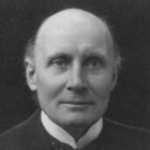
Alfred North Whitehead was a United Kingdom mathematician and philosopher best known for his work in mathematical logic and the philosophy of science. In collaboration with Bertrand Russell, he co-authored the landmark three-volume Principia Mathematica. He was instrumental in pioneering the approach to metaphysics now known as process philosophy. Lewis Samuel Feuer wrote a dissertation under Alfred North Whitehead.
